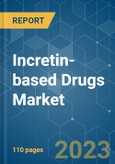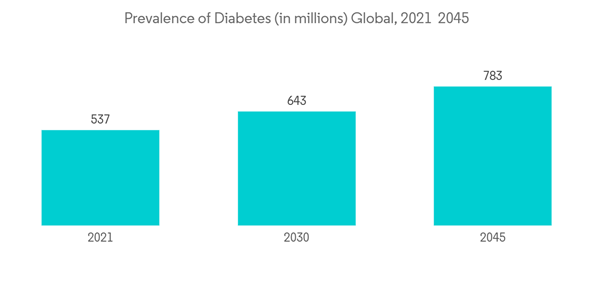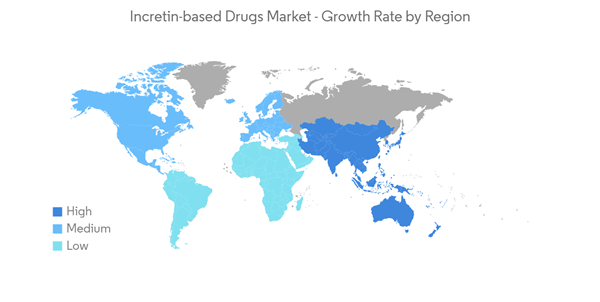Initially, COVID-19 impacted the incretin-based drugs market in its initial phase due to the cancellation of elective procedures for chronic diseases, including diabetes. However, the virtual consultations for diabetes and rising awareness about the management of diabetes allowed patients to continue their incretin-based drug medication. COVID-19 also had an adverse impact on people with diabetes. For instance, according to an article published in the Journal of Pharmacy Practice in May 2022, COVID-19 was associated with a high mortality risk among diabetes mellitus (DM) patients. The studied market is expected to remain unaffected by the emergence of new variants of COVID-19 and is further expected to show a significant growth rate during the forecast period.
The incretin-based drugs market is expected to grow during the forecast period owing to the high burden of Type- 2 diabetes globally. For instance, as per the International Diabetes Federation (IDF) 2021 report, the number of adults (20-79 years) with diabetes was 536.6 million in 2021 and is predicted to reach 783.2 million by 2045. The prevalence of diabetes worldwide was 10.5% in 2021 and is projected to be 12.2% in 2045. The high burden of diabetes requires an incretin-based drug for normalizing blood glucose levels, thereby propelling market growth.
Furthermore, according to the Division of Nutrition, Physical Activity, and Obesity, National Center for Chronic Disease Prevention and Health Promotion, data published in May 2022, the obesity prevalence was 39.8% among adults aged 20 to 39 years, 44.3% among adults aged 40 to 59 years, and 41.5% among adults aged 60 and older. Obesity is one of the most important factors which are expected to drive the incidence of diabetes. Therefore, the high burden of obesity worldwide is also expected to drive market growth during the forecast period.
Additionally, as per a Statpearls article updated in August 2022, DPP-4 inhibitors are also called gliptins, a class of oral diabetic medications approved by the Food and Drug Administration (FDA) to treat type 2 diabetes mellitus in adults. The FDA-approved DPP-4 includes sitagliptin, saxagliptin, linagliptin, and alogliptin. Vildagliptin has approval from the European Medicines Agency (EMA) but not from the FDA. Therefore, the large number of available approved DPP-4 creates an opportunity for market players to manufacture and market incretin-based drugs during the forecast period.
Therefore, owing to the factors such as the high burden of diabetes and rising approvals of DPP-4, and advantages offered by the drugs in the management of diabetes, the studied market is anticipated to witness growth over the analysis period. However, lack of reimbursement and poor accessibility to drugs, especially in developing countries, are the factors expected to restrain the market growth during the forecast period.
Incretin-based Drugs Market Trends
Glucagon-like Peptide-1 (GLP-1) Receptor Agonists Holds Significant Share in the Global Incretin-Based Drugs Market
Glucagon-like peptide-1 agonists are a class of medications utilized in the treatment of type 2 diabetes and obesity. Examples of drugs in this class include exenatide, lixisenatide, liraglutide, albiglutide, dulaglutide, and semaglutide. The segment is expected to grow during the forecast period owing to the high burden of diabetes, and obesity, rising research activities, and product launches and approvals by market players.According to a Statpearls article updated in November 2022, the addition of a GLP-1 analog should be considered in patients with a metformin contraindication or intolerance, in patients with a hemoglobin A1c greater than 1.5% above target, or in patients who do not reach their target A1c in three months, especially in patients with atherosclerosis, heart failure, or chronic kidney disease. Therefore, the advantage of GLP-1 in metformin-resistant patients is expected to propel the demand for GLP-1 during the forecast period.
Furthermore, product approvals and launches by market players significantly add to the market growth. For instance, in May 2022, the US FDA approved Mounjaro (tirzepatide) injection to improve blood sugar control in adults with type 2 diabetes as an addition to diet and exercise. The rising approvals are expected to boost segment growth.
Therefore, the above-mentioned factors, such as the advantage of GLP-1 and rising approvals, the segment is expected to witness significant growth during the forecast period.
North America is Expected to Dominate the Incretin-Based Drugs Market Over the Forecast Period
North America is expected to dominate the market owing to factors such as the rising incidence of diabetes and obesity, product launches, and approvals, along with the high concentration of market players in the region.As per IDF 2021 report, the number of adults (20-79 years) with diabetes in the North American region (including the United States, Canada, and Mexico) was 49.3 million in 2021. As per the same source, the number of diabetes in the North American region is predicted to reach over 55 million by 2030. The rising burden of diabetes in the region is expected to propel the demand for needle-free insulin delivery devices, thereby augmenting market growth.
Furthermore, according to the World Population Review 2022 data, around 29.4% of the people in Canada were affected by obesity. The high burden of obesity in the region is associated with a high probability of developing type-2 diabetes during the forecast period, thereby propelling the market growth.
Additionally, the strategic initiatives adopted by market players, such as product approvals, launches, and partnerships to expand the offerings, are expected to propel the market growth. For instance, in December 2021, the Food and Drug Administration approved the second biosimilar insulin product, Eli Lilly’s Rezvoglar (insulin glargine-aglr). Rezvoglar (insulin glargine-aglr) is biosimilar to Lantus (insulin glargine). Also, in July 2021, the United States Food and Drug Administration approved the first interchangeable biosimilar insulin product, indicated to improve glycemic control in adults and pediatric patients with Type 1 diabetes mellitus and in adults with Type 2 diabetes mellitus.
Therefore, owing to the above-mentioned factors, such as the high burden of diabetes and obesity, rising product approvals, and launches by market players, the growth of the studied market is anticipated in the North America Region.
Incretin-based Drugs Industry Overview
The incretin-based drugs market is moderately competitive. Some key players are AstraZeneca, Boehringer Ingelheim Pharmaceuticals Inc., Eli Lilly, GlaxoSmithKline PLC., Merck Sharp & Dohme Corp., Novartis AG, Novo Nordisk, and Sanofi SA, among others, hold the major share in the market.Additional Benefits:
- The market estimate (ME) sheet in Excel format
- 3 months of analyst support
This product will be delivered within 2 business days.
Table of Contents
Companies Mentioned (Partial List)
A selection of companies mentioned in this report includes, but is not limited to:
- AstraZeneca
- Boehringer Ingelheim Pharmaceuticals, Inc.
- Eli Lilly
- GSK Plc
- Merck & Co., Inc.
- Novartis AG
- Novo Nordisk
- Sanofi










